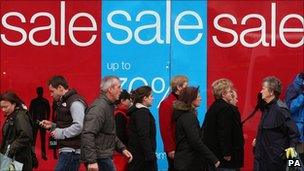Will recession return to the high street?
- Published
- comments

The big squeeze on real, average take home pay is only happening now
It's been tougher for retailers and consumer-facing businesses than they've been used to over the past three years. But my goodness it could have been a good deal worse.
That said, if the squeeze on the high street has been dampened, that squeeze could yet become more painful, with the dampeners removed - as they have been.
Here's what I'm on about.
Official statistics published last week showed that although GDP per head in the UK fell 6.9% in the great recession of 2008-9, average take home incomes actually grew in this period - even after taking account of inflation.
According to an analysis by the Institute for Fiscal Studies, the median income in the UK grew by 1% in 2009-10 and the mean average grew by 1.6% - after slightly smaller rises in 2008-9.
So what on earth is going on? If the economy was shrinking by more than it has done since the 1930s, where was all this money coming from that was going into consumer's pockets and wallets?
And don't say "from the slashing of interest rates by the Bank of England", because these figures are for incomes before outlays on debt, spending on the basics and so on.
Now incomes from employment were typically flat or falling from 2008-2010. So, according to the IFS, take home pay was buoyed by an injection from elsewhere - by significant transfers from the state, in the form of benefits and tax credits. In a way those transfers can be seen as the corollary, in part, of the UK's ballooning deficit.
But much of this transfer from the state appears to have been an accident. Difficult as it is to recall now, 2009 was a period of relatively subdued inflation, because of the deflationary impact of recession: taxes and benefits were uprated by an inflation rate which then turned out to be much higher than what actually happened to prices in the subsequent 12 months.
As a result, says the IFS, income received by households from benefits and tax credits rose by a staggering 6.7% in real terms during 2009-10 and by 5.6% per annum between 2007-8 and 2009-10.
Given the sheer number of British households that under the Labour government became eligible for tax credits, and given the rise in unemployment, this increase in benefits and tax credits represented a massive boost to households' spending power.
Which is why households were able both to save a bit more, thus reducing to a limited extent the excessive debts they had accumulated in the boom years, and to continue spending to an extent: it is very striking that after the initial flurry of retailing collapses - notably those of Woolworth and Zavvi - in late 2008 and early 2009, there has been pain on the high street but not carnage.
Here's the difficult message. What you may have worked out is that the boost to household income from tax credits and benefits rising faster than inflation has now gone into hard, eyewatering reverse.
RPI inflation has been around 5% in 2010-11, after benefits and tax credits were increased around 2% in April last year. And this year, transfers from the state to households have been uprated by a bit over 3%, compared with inflation that is expected to be at least a couple of percentage points higher than that.
Or to put it another way, there will be a fall in real terms in income from tax credits and benefits.
And, of course, income from employment is also running at 2 or 3 percentage points below inflation on RPI and CPI measures.
Now if you think that interest rates are set to rise before the end of the year, that'll further depress consumers' ability to spend. Also, if you take the view (which not everyone does) that households need to continue to save and pay down debt that is still a relatively high 160% of disposable income, then households' expenditure is likely to remain subdued for some considerable time.
There is reason to believe, as the IFS points out, that the big squeeze on real, average take home pay is only happening now, some considerable time after the official end of the recession. Which means that for the retailing and consumer-facing sector, conditions which feel a lot like recession may persist, whatever the headline GDP statistics show.